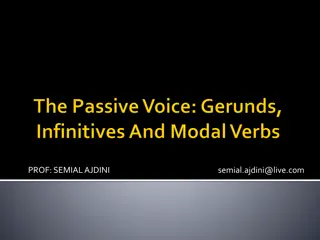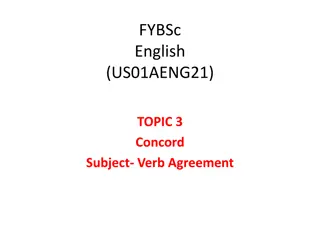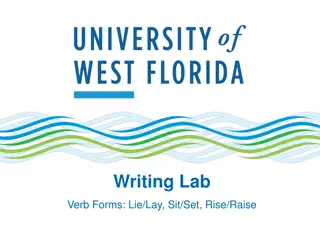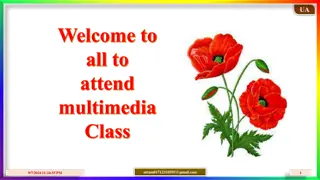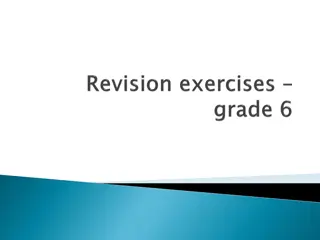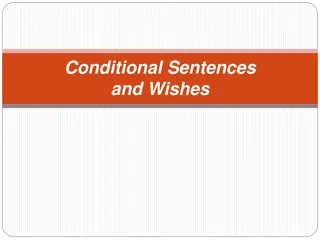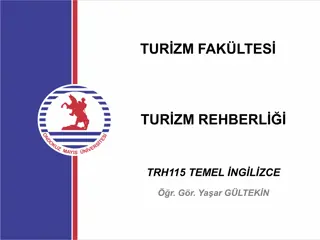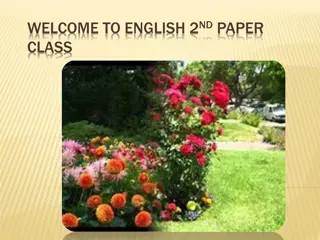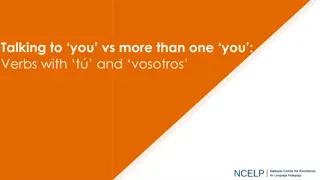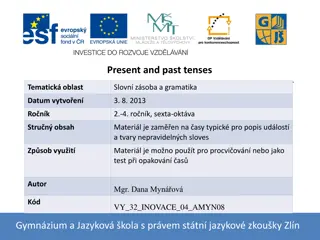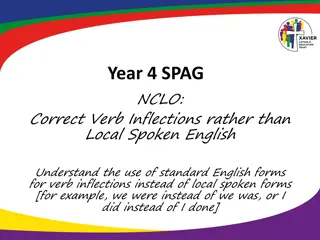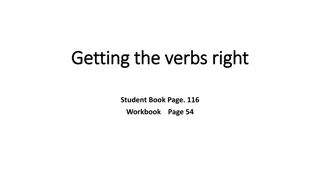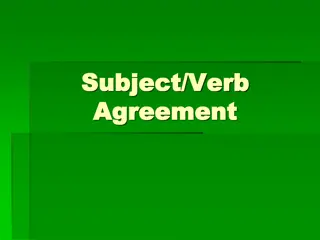Understanding Verb Forms in English Language
Verb forms in English language play a vital role in conveying time relations, shades of possibility, and certainty in a text. Explore the significance of present and past tenses through examples and analyses. Delve into Michael Morpurgo's use of verb forms in "Private Peaceful" to understand the impact of tense choices on narrative storytelling.
Download Presentation

Please find below an Image/Link to download the presentation.
The content on the website is provided AS IS for your information and personal use only. It may not be sold, licensed, or shared on other websites without obtaining consent from the author. Download presentation by click this link. If you encounter any issues during the download, it is possible that the publisher has removed the file from their server.
E N D
Presentation Transcript
BUILDING TEACHERS SUBJECT KNOWLEDGE: VERB FORMS
Verb forms There are only two tenses in English: present and past (the future is an aspect of the present tense) Verb forms establish time relations in a text. Verb forms express shades of possibility and certainty. Try explaining the difference in meaning between the following statements, imagining a context/scenario for each: I remember. I am remembering. I should have remembered. I might have been remembering. I will remember. If you were writing about a memory, what tense would you use?
In Private Peaceful, the narrative switches between past and present tense. In this description of a gas attack in the trenches, why do you think the writer has chosen to use the present tense? How differently might we respond if it was narrated in the past tense? (Try changing the verbs to see the effect) The gas is only feet away now. Through a yellow mist I see the trench filling up with it. It drifts into the dugouts, snaking into every nook and cranny, looking for me. It wants to see us all out, to kill us all, every one of us. Still I do not breathe. I see men running, staggering, falling. I hear Pete shouting out for me. Then he s grabbing me and we run. Half-blinded by my mask I trip and fall, crashing my head against the trench wall, knocking myself half-senseless. My eyes are stinging. My lungs are burning. I am coughing, choking, retching. Private Peaceful, Michael Morpurgo
Michael Morpurgo could have used the simple present tense for all the verbs (snakes, looks, run, grabs etc.). But he uses a high number of present participles (-ing verbs), in non-finite clauses or with an auxiliary verb to form the present progressive. Can you verbalise (make explicit) for students the purpose and impact of these choices? The gas is only feet away now. Through a yellow mist I see the trench filling up with it. It drifts into the dugouts, snaking into every nook and cranny, looking for me. It wants to see us all out, to kill us all, every one of us. Still I do not breathe. I see men running, staggering, falling. I hear Pete shouting out for me. Then he s grabbing me and we run. Half-blinded by my mask I trip and fall, crashing my head against the trench wall, knocking myself half-senseless. My eyes are stinging. My lungs are burning. I am coughing, choking, retching.
Verb forms chart Non- finite Present tense Past tense Non- finite Non- finite Infinitive Present simple Present progressive be+ -ing Present perfect have+ -ed Present simple passive be+ -ed Past simple Past progressive be + -ing Past perfect have + -ed Past simple passive be + -ed Present participle -ing Past participle -ed to work works is working has worked is worked worked was working had worked was worked working worked to spend spends is spending has spent is spent spent was spending had spent is spent spending spent to go goes is going has gone is gone went was going had gone was gone going gone to see sees is seeing has seen is seen saw was seeing had seen was seen seeing seen Verb forms establish time relations in a text. Verb forms express shades of possibility and certainty. Consolidate understanding by generating more examples with a new infinitive e.g to dream; to take; to speak
In this extract from Kensukes Kingdom, the narrator is remembering his childhood. Look at the highlighted verbs. What information do they give you about the timescale of the events being remembered? How true is this to the way that memory works? Every weekend I dida paper round from Mr Patel s shop on the corner. I was saving up for a mountain bike. I wanted to go mountain biking up on the moors with Eddie. The trouble was, I would keep spending what I d saved. I m still the same that way. Sundays were always special, I remember. We d go dinghy sailing, all of us, on the reservoir, Stella Artois barking her head off at the other boats as if they d no right to be there. My father loved it, he said, because the air was clear and clean, no brick dust he worked down at the brickworks. We had some great days on the water. We d go out when it was rough, when no one else would, and we d go skimming over the waves, exhilarating in the speed of it, the sheer joy of it. (From Kensuke s Kingdom, Michael Morpurgo)
Look at the highlighted verbs. What information do they give you about the possibility or certainty of the events being remembered? How true is this to the way that memory works? Every weekend I did a paper round from Mr Patel s shop on the corner. I was saving up for a mountain bike. I wanted to go mountain biking up on the moors with Eddie. The trouble was, I would keep spending what I d saved. I m still the same that way. Sundays were always special, I remember. We d go dinghy sailing, all of us, on the reservoir, Stella Artois barking her head off at the other boats as if they d no right to be there. My father loved it, he said, because the air was clear and clean, no brick dust he worked down at the brickworks. We had some great days on the water. We d go out when it was rough, when no one else would, and we d go skimming over the waves, exhilarating in the speed of it, the sheer joy of it. (From Kensuke s Kingdom, Michael Morpurgo)
Building verb phrases: consolidation We remember the First World War. Modal Auxiliary Lexical/Main may are remember might were remembered can have remembering could had will have been would must Play with different combinations, noting different nuances of meaning
Recap The verb slot in a clause can be filled with one or more words Auxiliary and modal verbs work with lexical verbs to form different aspects of the present and past Be, have and do are Primary Verbs they can act as either the lexical/main verb in a clause OR as an auxiliary eg We were at war; we were remembering the war The choice of verb form, including the tense and aspect, enables the writer to express subtle shades of meaning 9
Modal verbs Type of auxiliary verb and help form verb phrases: I would keep spending Always placed first in a verb phrase, before other auxiliaries: It might have been and before lexical verbs: we would go Express degrees of possibility and certainty Do not have an s form or non-finite forms (-ing, -ed, to - ) Can have a negative form (may not, might not) when they are often contracted (couldn t; won t; shan t) may might must shall should can could will would (ought/need to)
Modal verbs in Private Peaceful They ve gone now, and I m alone at last. I have the whole night ahead of me, and I won t waste a single moment of it. I shan t sleep it away. I won t dream it away either. I mustn t, because every moment of it will be far too precious. I ve had nearly eighteen years of yesterdays and tomorrows and tonight I must remember as many of them as I can. I must remember them. Try substituting other modal choices to see the effect: may might shall should can could will would (ought/need to) Which choices make Tommo sound most determined to stay awake and remember the last eighteen years with his brother? Which choices sound more tentative?
Teaching for progression Using modal verbs to indicate degrees of possibility is Y5 content in NC though they may well have been taught before this; likely to be taught at KS3; important for GCSE critical analysis What might characterise progression in teaching and learning about modal verbs? What might be the layers of difficulty or challenge? How might understanding of modal verbs be revisited and built on over time, not just repeated?
Teaching for progression ? Need to consolidate younger/weaker students understanding of role of verb in a sentence fact that modals go with other verbs to modify them Widening range of contexts eg moving beyond modals in simple instructions to use in evaluations; as a rhetorical device for persuasion; in formal style needed for critical responses to texts Widening understanding of modality as a concept and other ways of expressing degrees of possibility eg through carefully placed adverbs (including more sophisticated ones eg fundamentally , crucially , undoubtedly ) or through more sophisticated sentence structures that emphasise one idea over another eg not only...but also... ; Perhaps X...whereas Y... ; If X .then Y .
The passive voice Form Auxiliary verb be + past participle of the main verb. Uses: To minimise the importance of the subject or agent of the verb, or to hide it To create a distancing effect from the topic or greater objectivity To create a more formal tone The past is remembered. The dead are honoured. They will not be forgotten.
Children are separated from their parents. Modal may might can could will would must should shall (ought/need to) Lexical/Main Auxiliary separated are were have been had been are being were being be Practise building verb phrases in the passive voice to create different shades of meaning
Grammar in context Read the extract from The Day of Ahmed s Secret by Florence Parry Heide. Discuss first impressions: What do we learn about Ahmed s daily life? What do we learn about his relationship with his father? Using the verb chart to help, look closely at the author s choices of verb forms. What do they show us about Ahmed s daily life and his relationship with his father? What more can we say?
Read the extract from The Day of Ahmeds Secret by Florence Parry Heide & Judith Heide Gilliland (1997). What can we say about the relationship between Ahmed and his 17 father? How do the verbs tell us about this relationship?




